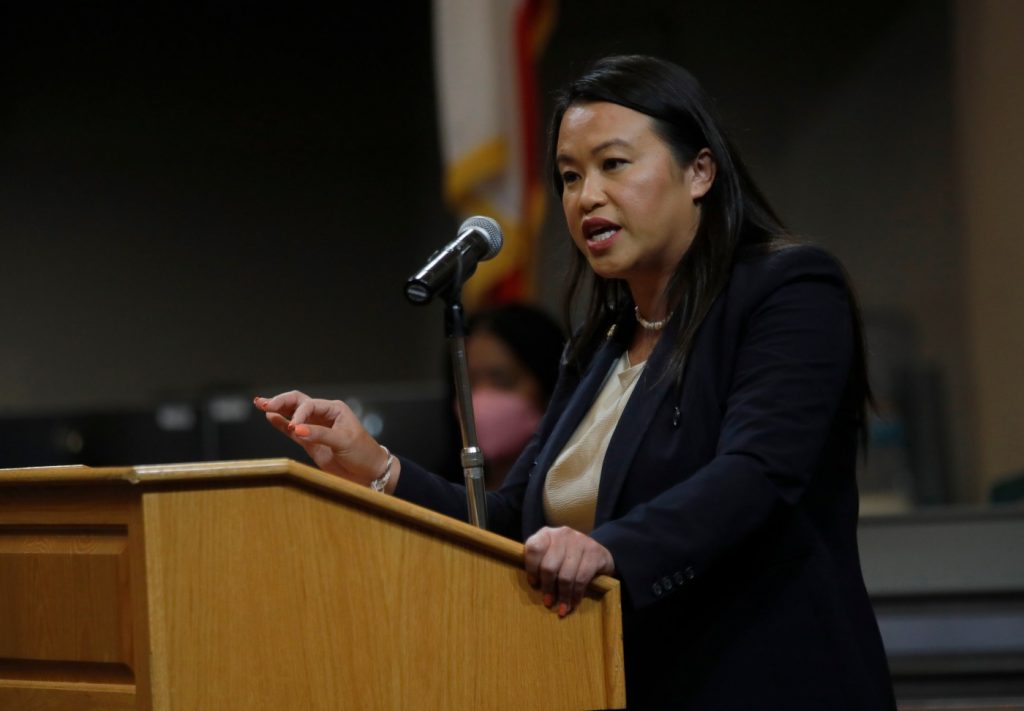Oakland Mayor Sheng Thao directed city agencies on Monday to ramp up homeless sweeps in an effort to “return public spaces to the public.”
In an online video announcing the executive order, Thao said the city will prioritize clearing encampments near schools, playgrounds, small businesses and homes, as well as camps that block roadways or pose serious health and safety risks.
“Being homeless is not a crime in Oakland, but it doesn’t give the right to break other laws,” she said.
Officials estimate roughly 5,490 homeless people are in Oakland, a 9% increase since 2022. More than two-thirds live outdoors, in vehicles or in other places not meant for habitation. The rest stay in shelters.
Oakland is the latest Bay Area city to take a tougher stance on encampments after a landmark U.S. Supreme Court ruling in June granted cities broad new authority to clear out homeless people’s tents, vehicles and belongings even when they have nowhere else to go. In the wake of the ruling, Gov. Gavin Newsom upped the pressure on local governments to act by threatening to withhold state funding if they fail to get more people off the street.
In San Francisco, Mayor London Breed has made national headlines for ordering a citywide crackdown on encampments and directing officials to fine or arrest homeless people who decline to move into a shelter. In Berkeley, officials this month agreed to start sweeping encampments without first offering shelter or housing. In San Jose, meanwhile, Mayor Matt Mahan has said the high court’s ruling has made it easier to enforce the city’s expanded no-camping laws. Fremont is also considering cracking down on homeless camps.
Thao, who faces a tough recall election — launched in part over the city’s struggle to curb homelessness — this November, had until now been relatively quiet about her plans to update the city’s response to encampments following the ruling. But in announcing her order, she said the court has cleared the way for police, firefighters, public works crews and other city officials to fully enforce the city’s “encampment management policy.”
In addition to moving homeless people away from schools, homes and businesses, Thao directed officials to shut down camps that could set fire to freeway overpasses, BART tracks or other critical infrastructure. She also ordered city departments to target camps where people store flammable materials such as gasoline or propane, or where biological waste poses an environmental risk to sewers or waterways.
City officials said they will continue offering shelter to every homeless person forced out by a sweep. But Oakland, like every other big city in the Bay Area, lacks anywhere near enough shelter space for everyone on the street. And even when beds do become available, homeless people often refuse them for a range of personal reasons, from health and safety concerns to a reluctance to follow curfews.
On Monday, homeless advocates condemned Thao’s order, calling on the city to instead focus on funding permanent affordable housing. They say the city’s ongoing sweeps are already traumatizing for homeless people and accomplish little but shuffling camps from one neighborhood to another.
The “order will push the most vulnerable members of our community into even more unsafe conditions,” said Talya Husbands-Hankin, founder of the Oakland advocacy group Love and Justice in the Streets.
Related Articles
Fremont could ramp up sweeps on homeless encampments, ban camping and overnight parking
Mahan: Let California judges require drug treatment that ends suffering on streets
Gov. Newsom signs housing bill package to ‘turn up the heat’ on development-averse cities
Homeless students can sleep safely in their cars at this California college. Other campuses say no
San Jose won’t sell interim housing site for jail diversion program after community backlash
In her announcement, Thao recounted how she briefly lived out of a car with her young son after escaping an abusive relationship. “At no time did I look to pitch a tent. I was seeking, and deeply grateful for, affordable housing and services,” she said.
Even as Oakland ramps up sweeps, Thao vowed to help find homeless people permanent housing. She highlighted $200 million in affordable housing funds the city has secured through Measure U, a bond measure voters approved in 2022.
“Living on the streets is not a safe or dignified way for anyone to live,” she said.


